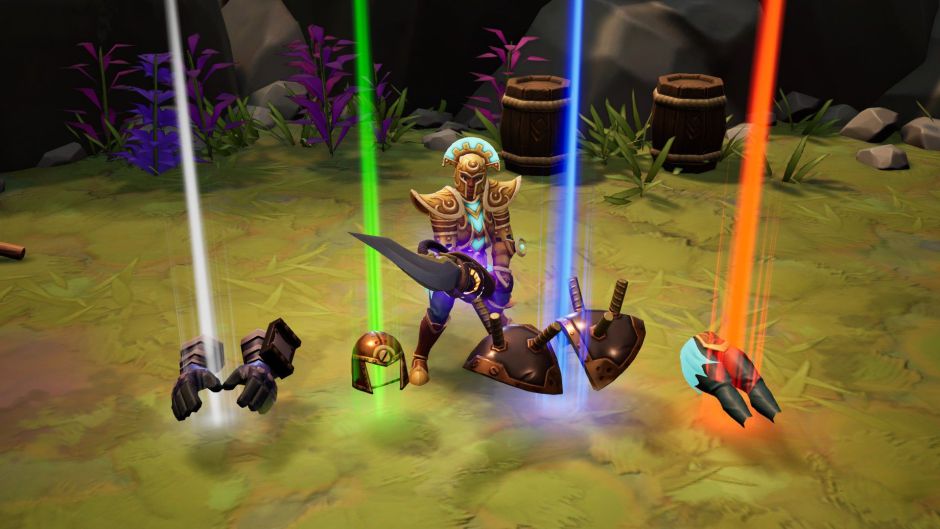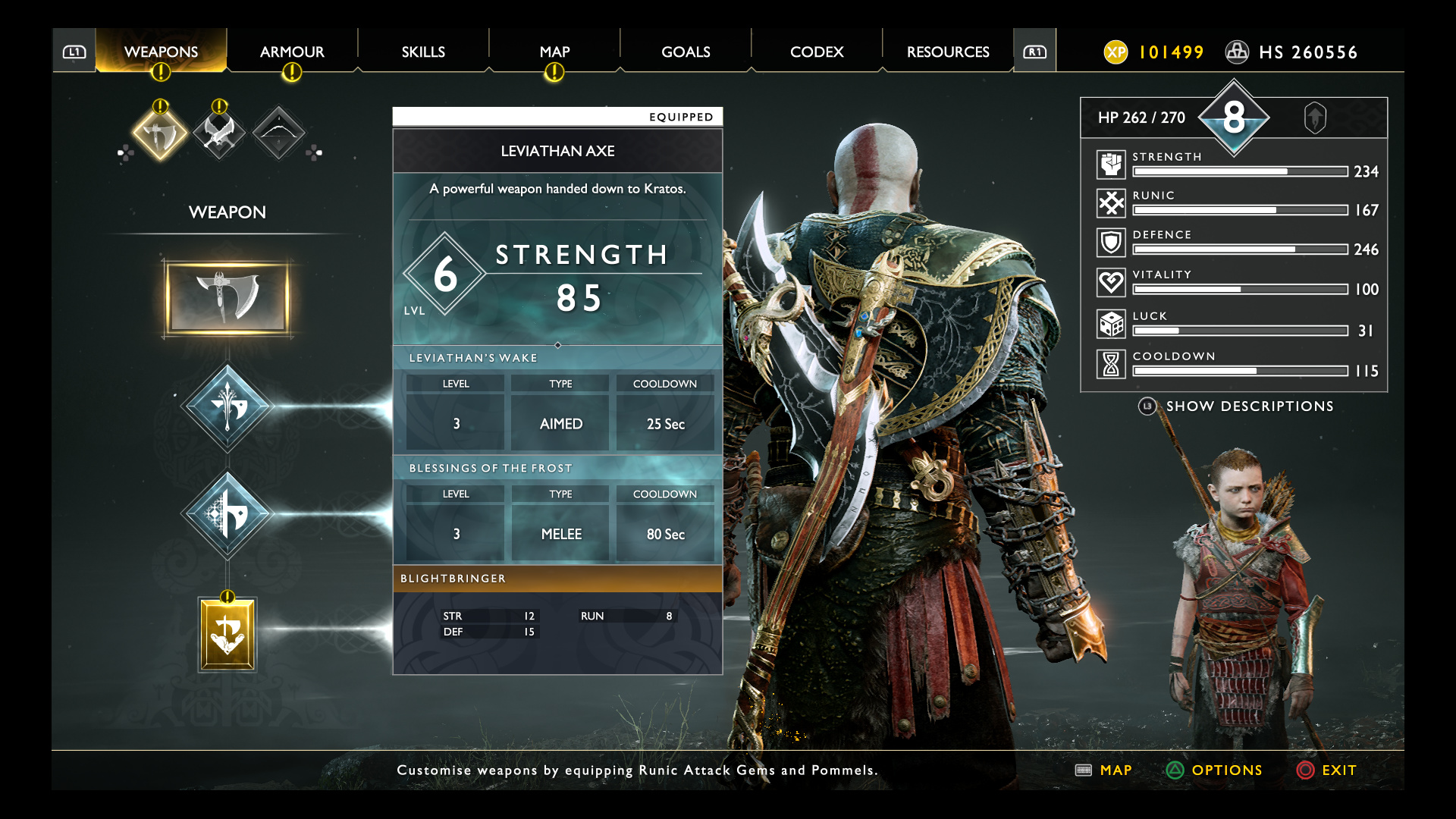I am begging you to stop adding loot to games that don't need it
Loot is bloating more and and more of today's games with useless filler items and inventory management. It doesn't have to be this way!

I play videogames for a lot of reasons: to flood my brain with dopamine from intense action, to hang out with my friends on Discord, to explore imaginary worlds I could've never dreamed up myself. I don't play videogames to spend hours sifting through garbage. If I wanted to shove my hands into piles of rotting trash to root around for something of value, I'd go to the landfill and lose my mind in pure ecstasy. But—and I don't think this is a particularly hot take—picking up garbage sucks, actually. I do not want to do it. So why do so many videogames think I'm some kind of little trash-loving freak?
Loot is now the pink slime of game mechanics: some filler you squirt in between the meat
There was a time, not that long ago, when I felt like I could safely identify a "loot game" from afar. If not quite a genre, loot games have typically been a subset of RPGs that use a constant drip feed of new gear as a lure and a key element of combat. Diablo gave us color-coded loot, and a few years later it became a defining feature of MMOs like World of Warcraft. It's an obvious pairing: MMOs want players to stick around for hundreds or thousands of hours, anyway, so why not give them a steady stream of rewards to sell, with the occasional thrill of a truly great item drop?
Then Borderlands happened, translating an idea that had mostly existed in fantasy RPGs to first-person shooters. I loved it at the time: it was exciting to open up a chest and find a shotgun that fired 27 flaming pellets at once or whatever. But if I could go back in time and kill baby Borderlands in the crib for the slim chance to send today's big-budget games down an alternate timeline, I think I might do it.
Loot systems have infested so many of today's shooters and action games, weighing them down with useless trash. Surely God of War and Gotham Knights did not begin development with the shared power fantasy of swole sanitation worker. But here we are.
The sin of meaningless stats

In 2021, we talked to a range of game developers for an article titled Why bad items in games need to exist. For the most part, the items we highlight fit into a couple categories. There are bad items that add interesting and memorable variety to a game: "Long past the point where it was a liability, I wore [Morrowind's] silly Colovian Fur Helm because I'd started thinking it was funny defeating ghosts and monsters while wearing a conical nipplehat," Jody wrote. Then there are bad items that simply serve as a useful point of reference for better items. In Borderlands 2, for example, when you pick up a named weapon it catches your eye, standing out from the sea of mostly crappy randomly generated pistols and SMGs. It's this latter form of loot that far too many games are now abusing.
Here's just a short list of games from the past few years that have copied Diablo-esque color-coded loot:
- Assassin's Creed Valhalla
- Ghost Recon Breakpoint
- Fortnite, Apex Legends, and Call of Duty: Warzone
- Gotham Knights and, soon, Suicide Squad: Kill the Justice League
- Nioh, Nioh 2, Final Fantasy Origin: Stranger of Paradise, and Wo Long: Fallen Dynasty from Team Ninja
- Horizon Zero Dawn and Forbidden West
- God of War
- Dying Light 2
- Marvel's Avengers
- Escape From Tarkov
- Hogwarts Legacy
Perhaps I was overly harsh in blaming Borderlands for this loot-obsessed design slurry, because Bungie's Destiny 2 and its Gear Score probably deserve more of the blame. As our Robin Valentine recently wrote about the negative reception for the upcoming Suicide Squad: "The default approach of games like this is to chase the Destiny model—a slow treadmill of progress based around incrementally better weapons and accessories […] That just simply isn't the superhero fantasy. When they increase in power, it is by great leaps, not 3% better armour penetration."
The biggest gaming news, reviews and hardware deals
Keep up to date with the most important stories and the best deals, as picked by the PC Gamer team.
How did hoovering up endless junk loot become standard?
Almost every game above is guilty of the sin of meaningless stats: gear with tiny bumps to numbers that we'll never perceive while playing. They're a slight of hand trick. This kind of loot dangles a reward in front of you with a tiny dopamine hit of incrementally "better gear" within, and if it feeds you those constantly you may not notice that the numbers mostly mean jack shit.
RPGs are guilty of this too, of course, but there's a design history there that can justify a proliferation of loot. In older, often harder RPGs, the difference of a few defense points between a leather jerkin and a steel cuirass could be stark. In turn-based games, the methodical process of outfitting your party with the best gear you can find and afford is key to both strategy and flavor, because the power fantasy of the game harkens back to forming a D&D adventuring party. In Diablo, you're meant to loop through the game so many times, the loot has to scale exponentially. You're also just, like, clicking a lot, and loot effects can help fill in the gaps of interactivity that other games already have with more nuanced verbs like "aiming a gun" and "button combos."

Loot feels so blatantly out of place in the likes of God of War because it's not a game you play over and over again, or impactful enough to completely upend your strategy, or core to the power fantasy of being a warrior god. It feels out of place in action games like Nioh because the depth should flow from execution in combat, not marginal gear improvements.
In triple-A design loot is now the pink slime of game mechanics: some filler you squirt in between the meat to make sure no one finds a gap. The result is a smoothed-over homogeneity that dilutes their unique strengths.
Tiered loot often makes games more boring, samey, or unnecessarily padded; but what really bothers me is the tedium.
Our new menu hell
If there's a game with worse loot than Final Fantasy Origin: Stranger of Paradise, I've never seen it. Every enemy drops loot; you can easily pick up a hundred pieces in a single 20-minute mission. The vast majority of it is insignificant white or green rarity gear you'll never use, and there's so much of it that the developers built an entire extra system for automatically culling the items you pick up. The sad thing is, underneath that loot Stranger of Paradise is a shockingly fun action-RPG that pulls jobs and abilities from the entire Final Fantasy series.
People would be raving about this combat system if Stranger of Paradise hadn't been instantly memed to death.
Team Ninja's other recent action games like Nioh and Wo Long are similarly overburdened with endless loot. I haven't seen a single player praise these systems, and yet for some reason they remain. How did hoovering up endless junk loot become standard? Sure, players like little treats for killing enemies, but as soon as we grasp that every item we pick up is just going to be the same shit with slightly different stats, we're mentally going to write off everything below the highest tier rarity.
A badly implemented Diablo loot system just becomes background noise; an irritant to filter out when we should be having fun. Why do we put up with pausing to clear our maxed out inventories in genres that once just let us play?
In the old 2000s God of War games and in action contemporaries like Devil May Cry and Ninja Gaiden, you'd earn a few new weapon types throughout the game. Each acquisition was a major moment, offering an entirely new playstyle and often new combos to unlock to further enhance each weapon. It was rad!
This is not outdated design. It's confident design. It's how you build an action game that says "go tear shit up" instead of, I don't know, "become the God of Chores." Build variety in loot-based games is cool—I dig that you can customize Kratos's axe to do lifesteal or poison enemies—but throw in farming crafting components, upgrading gear, and luck and cooldown stats and you've successfully drowned the action in hyper-atomized tedium.
Does combat in battle royales like Fortnite, Apex Legends and Call of Duty Warzone really benefit from the minutes spent picking through containers full of common weapon drops hoping for a rare? Apex's strength is its movement and gunplay; Fortnite's is its ever-shifting variety of abilities and activities. Both could survive or even thrive without tiered loot. Call of Duty Warzone's seems even less significant, considering players rejected ground loot and pushed the developers to prioritize their unique loadouts instead.
Loot rarity has become such a common language in modern games that I question whether it's ever the best solution, or simply an easy shortcut. At least the rare game like extraction shooter Escape From Tarkov does something to make loot feel genuinely valuable—you can permanently lose your hard-earned legendary to another player taking you out. But most of the time loot is just causing the sameification of games that could otherwise reach for their own identities. Ubiquitous does not always mean good. Even 50 Cent sometimes has to take out the garbage, but that sure as hell doesn't mean he likes it.

Wes has been covering games and hardware for more than 10 years, first at tech sites like The Wirecutter and Tested before joining the PC Gamer team in 2014. Wes plays a little bit of everything, but he'll always jump at the chance to cover emulation and Japanese games.
When he's not obsessively optimizing and re-optimizing a tangle of conveyor belts in Satisfactory (it's really becoming a problem), he's probably playing a 20-year-old Final Fantasy or some opaque ASCII roguelike. With a focus on writing and editing features, he seeks out personal stories and in-depth histories from the corners of PC gaming and its niche communities. 50% pizza by volume (deep dish, to be specific).

